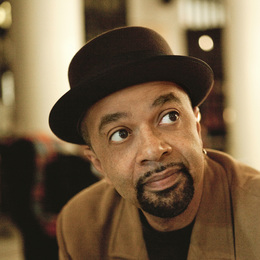
Brooklyn-born James McBride has had a diverse and storied career, with time spent as a musician, composer and journalist, as well as professor at New York University. (He also teaches a music class at his church.) In most circles, he is best known for his work as a writer of renowned works such as “The Color of Water: A Black Man’s Tribute to His White Mother” and “The Good Lord Bird.”
We had the opportunity to speak with the Lambertville, N.J., resident about his past, present and future projects—including his newest work of nonfiction, “Kill ’Em and Leave: Searching for James Brown and the American Soul.” He also shared a bit of advice for aspiring artists.
How has your time as a journalist impacted your book writing?
I think it’s been crucial to my development as a writer, because journalism forces you to deal with facts and deal with research and deal with story detail, and when you write both in fiction and nonfiction you have to write scenes that are strong and that hold readers’ attention, particularly in this Internet-crazy time. … Everything has got to be all muscle, really, and journalism, to me, was the best training possible to become a serious writer. It forces you to deal with facts and with human emotion and how people move and how things evolve and so forth, so I recommend it for any young writer.
You once said, in a town-hall talk, that “Humor preserves my innocence.” How so?
[Laughs.] You know, I don’t remember what I say from one day to the next, but I think if I didn’t have a sense of humor, you know, I wouldn’t be able to get out of bed. I think every writer needs to have a piece of innocence preserved; that’s kind of the fuel that, you know, powers the machine, at least in my opinion. If you don’t have a sense of humor about things, it’s hard to cause that fuel to ignite to cause the kind of combustion you need to get your characters moving from one room to the next. I mean, writing is a very involved process—I mean, good writing—and it often involves a lot of emotional material, and if you don’t have a sense of humor and a sense of innocence and wonder about the world, then you really can’t create stories that work.
How did you move from writing fiction back to writing nonfiction with “Kill ’Em and Leave”?
I moved there with great difficulty. [Laughs.] You know, I was in the middle of a bad divorce, [and] I needed the money; that was one reason. And I really like James Brown and I was approached, I was asked to do the book. … Some members of his family wanted the real story about him to come out so I took it because I loved his work—and I still love his work—and I actually like him and admire him more now than I did before I wrote the book.
The title—“Kill ’Em and Leave”—sounds like great life advice, if not taken literally, of course. What exactly does it mean?
James Brown had a lot to do with the development of Al Sharpton. Al Sharpton spent 15 years at his feet learning, you know, traveling the country, and he used to tell Al Sharpton, “When you perform in front of an audience, you kill ’em and leave.” You give them everything and then you leave. … You don’t sit around waiting for people to show up, say you did a great job; you walk out. You’re like the hero in the Westerns. You come, you beat up the bad guy, and then you get on your horse and leave. He had a great sense of humor, James Brown did.
What’s the sagest advice you can offer young artists?
I’d say rewrite everything. I rewrite everything, even a letter. You know, I don’t think first drafts work. They might work for some writers, but they don’t work for me. I mean, sometimes, you know, there will be a burst of good stuff that works but we live in a society where … every high school kid in America is walking around with a CD of his latest spoken-word bits or trumpet solos or songs and so forth [and] the material is not rewritten. … I tell my students to write in longhand, and I advise some students to learn how to play, minimally, to play the piano. And if they’re rap artists, that they play drums and study the history of drums, the history of rhythm and so forth.
What do you like about being a teacher?
I love the students. I mean, they give me hope. They’re enthusiastic, they’re talented, they want to learn … [and] most of them work really hard. You know, I only take 12 students, so my students are among the best writers. … There’s a lot of writing talent in America. And, you know, those of us who are my age have a responsibility to try to pass on what we have.
Photograph by Chia Messina


